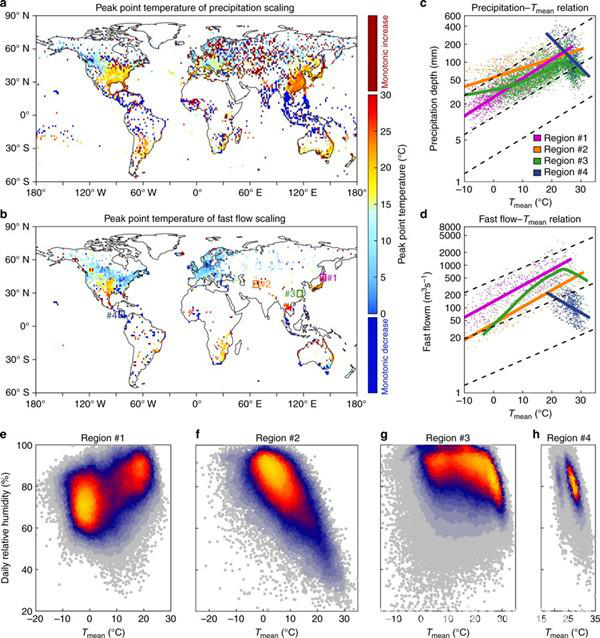On October 22nd, research findings by the Professor Guo Shenglian’s team from the State Key Laboratory of Water Resources and Hydropower Engineering Science were published online in Nature Communications. It is the first time that the thermodynamic responses of storm runoff extremes to climate and anthropogenic changes have been revealed.
The paper is titled Large increase in global storm runoff extremes driven by climate and anthropogenic changes with Wuhan University as its first authorized institution. Yin Jiabo, doctoral student in Grade 2016 is the first author. Professor Guo Shenglian and Professoer Pierre Gentine from Columbia University are corresponding authors of this paper. The project is supported by the National Key Research and Development Plan of China and the National Natural Science Foundation of China.
Global climate changes and human activities lead to increasing carbon dioxide concentration and a changed hydrological cycle and energy exchange process among atmosphere,hydrosphere and ecosphere,which result in a series of natural disasters. IPCC predicts that the world temperature will rise by 0.6 to 3.4℃ over the next ten decades.
The quantitative assessment of the hydrological responses to global climate and anthropogenic changes has been a common popular and difficult problem for hydrologist and meteorologists. The group led by Professor Guo extends the application of Clausius-Clapeyron scaling on the basis that the water vapor transport process in the atmospheric boundary layer governs precipitation pattern. They provide the first global quantitative assessment of the responses of storm runoff extremes to warming climate and anthropogenic activities. Based on the data collected from 26,593 weather stations and 7,237 runoff stations, this team estimates the long-term trend of extreme events first and gives a microscopic explanation for global rainfall and runoff changes. Moreover, they investigate the scaling relationship of extreme events with near-surface air temperature and atmospheric humidity by binning, and find a hook-like structure both in the relationship between precipitation–temperature scaling and runoff-temperature scaling, which illustrates how atmospheric dynamics and thermodynamics are bonded with extremes.

Meanwhile, the team noticed a higher scaling rate of runoff extremes compared to that of precipitation with temperature. Precipitation extremes usually indicate a sub-C–C scaling while storm runoff extremes largely exhibit a super C–C scaling. Saturation-excess and infiltration-excess runoff processes have changed due to global warming and high-intensity rainfall, resulting in the nonlinear increase in runoff coefficient. Deforestation and surface destruction change the storm runoff pathway. It is supported by “Infiltration–evapotranspiration trade-off hypothesis”. Another important factor lies in carbon dioxide. Generally, plant stomata open less widely under high carbon dioxide concentration. As a consequence, transpiration is reduced and soil moisture levels become higher, which accelerates responses of storm runoff to global warming.
This paper comprehensively analyses the influence of carbon emission, irrigation, vegetation destruction and surface change on extreme climate phenomena. It also illustrates a quantitative assessment of the responses of global storm runoff extremes to global warming and anthropogenic activities for the first time. The research results are expected to play a positive role in coping with global warming and providing solutions to flood prevention.
(Rewritten by Zhang Yuting, Edited by Zheng Lingling, Shen Yuxi, Hu Sijia)


